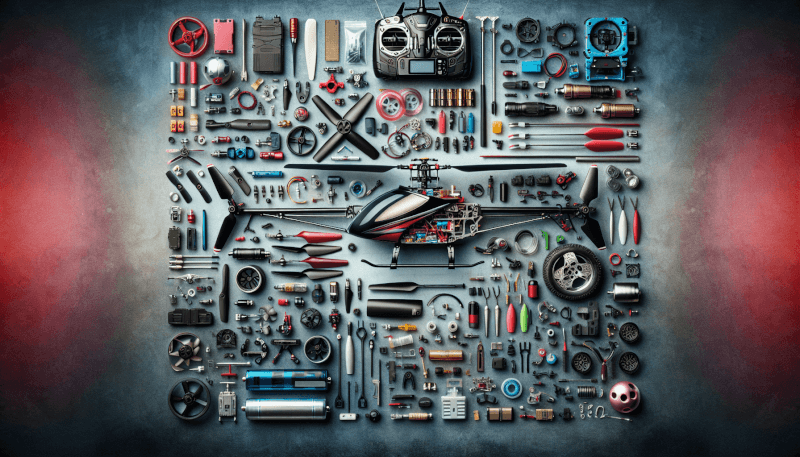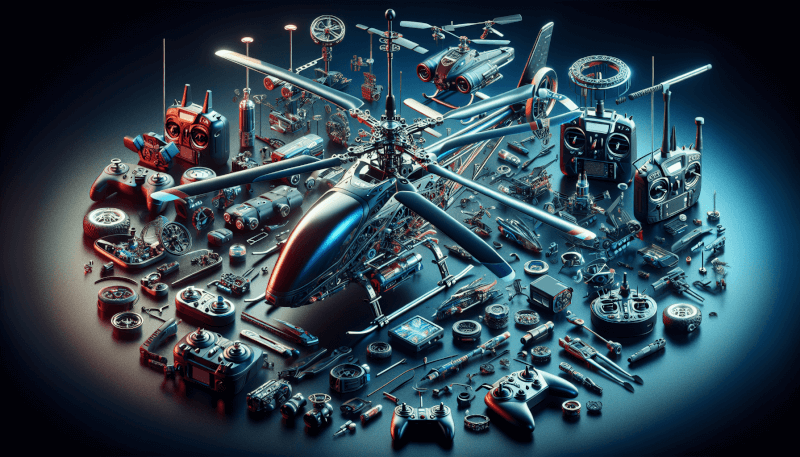If you’re a remote control helicopter enthusiast, then you know that finding the right accessories and add-ons to enhance your flying experience can be just as exciting as mastering those aerial maneuvers. From high-performance rotor blades to advanced gyro systems, there’s a whole world of RC heli accessories waiting to take your hobby to new heights. In this article, we’ll explore some of the most sought-after accessories and add-ons that will have you flying with precision and style in no time. So, buckle up and get ready to turbocharge your RC heli game!
1. Batteries and Chargers
1.1 LiPo Batteries
LiPo batteries, short for Lithium Polymer batteries, are the go-to choice for RC heli enthusiasts. They offer a high energy density, making them lightweight and perfect for powering your aircraft. These batteries come in various sizes and capacities, allowing you to choose the one that best suits your needs. LiPo batteries also have the advantage of providing a consistent power output throughout their discharge, ensuring reliable performance throughout your flight.
1.2 NiMH Batteries
NiMH batteries, or Nickel Metal Hydride batteries, are another popular option for RC heli pilots. These batteries offer a good balance between performance and cost, making them a great choice for beginners or those on a budget. NiMH batteries are known for their ease of use and durability. They also have a higher tolerance for overcharging and over-discharging compared to LiPo batteries, making them a safer option for novice pilots.
1.3 Chargers
To keep your batteries in top condition and ensure optimal performance, a high-quality charger is essential. There are various chargers available on the market, ranging from basic models to advanced smart chargers. Smart chargers offer features like balancing, which helps ensure each cell in the battery is charged evenly, prolonging its lifespan. When selecting a charger, it’s essential to consider factors such as charging speed, compatibility with different battery types, and safety features.
2. Transmitters and Receivers
2.1 2.4GHz Transmitters
A reliable and responsive transmitter is crucial for controlling your RC heli effectively. 2.4GHz transmitters have become the standard choice for most pilots due to their interference-free operation and improved range. These transmitters utilize frequency-hopping technology to avoid signal interference from other devices, providing a smooth and uninterrupted control experience. Additionally, 2.4GHz transmitters offer advanced features like programmable mixing, multiple flight modes, and telemetry compatibility, allowing you to customize your flying experience.
2.2 Receivers
To complement your transmitter, you’ll need a compatible receiver to capture and interpret the signals sent from the controller. Receivers are available in various sizes and configurations, ranging from simple units to advanced receivers with built-in stabilization systems. It’s essential to choose a receiver that matches the capabilities of your transmitter and supports the number of channels required for your specific setup. Additionally, some receivers offer additional features such as telemetry support, allowing you to monitor crucial parameters like battery voltage and signal strength in real-time.
2.3 Telemetry Systems
Telemetry systems provide valuable real-time data about your RC heli while in flight. These systems use sensors to measure various parameters such as battery voltage, motor RPM, GPS location, and more. The data collected by the sensors is transmitted to your transmitter, allowing you to monitor and analyze the performance of your aircraft. Telemetry systems provide invaluable information that can help you optimize your flying experience, ensure battery safety, and troubleshoot any issues that may arise.

3. Gyros and Stabilization Systems
3.1 Heading Hold Gyros
Heading hold gyros are essential components for maintaining stability and control in your RC heli. These gyros detect any undesired yaw movement and automatically correct it, keeping the helicopter heading in the desired direction. Heading hold gyros provide a more precise and locked-in feeling during flight, allowing you to perform advanced maneuvers with confidence. They are particularly beneficial for 3D flying, where precise control over the helicopter’s heading is crucial.
3.2 Flybarless Systems
Flybarless systems revolutionized the RC heli industry by eliminating the traditional flybar mechanism and replacing it with electronic stabilization. These systems use gyro sensors and advanced algorithms to stabilize the helicopter during flight, making it more agile and responsive. Flybarless systems offer a greater degree of customization and fine-tuning compared to traditional flybar setups. They allow you to adjust parameters such as sensitivity, responsiveness, and stability, tailoring the flying characteristics to your preference.
3.3 Stabilization Receivers
Stabilization receivers combine the functions of a receiver and a flybarless system into a single unit. These receivers offer built-in stabilization features, eliminating the need for a separate flybarless system and simplifying the setup process. Stabilization receivers provide beginner-friendly flight modes, allowing novice pilots to learn and practice flying with enhanced stability and reduced risk of crashes. As pilots gain confidence and skills, they can gradually reduce the stabilization assistance to unleash the full potential of their helicopter.
4. Upgraded Motors and ESCs
4.1 Brushless Motors
Upgrading to a brushless motor can significantly enhance the performance of your RC heli. Brushless motors offer higher power output, better efficiency, and longer lifespan compared to their brushed counterparts. These motors generate more torque, allowing for faster acceleration and higher top speeds. Brushless motors also run cooler and require less maintenance, offering a hassle-free experience. When choosing a brushless motor, it’s crucial to consider factors such as the motor’s size, KV rating, and compatibility with your helicopter’s power system.
4.2 Electronic Speed Controllers (ESCs)
Electronic Speed Controllers, or ESCs, regulate the power supplied to the motor and play a crucial role in controlling your RC heli’s speed and response. Upgrading to a high-quality ESC can provide smoother throttle response, improved motor efficiency, and better overall performance. Advanced ESCs offer features like programmability, brake functions, and motor timing adjustments, allowing you to fine-tune the power output to match your flying style. It’s essential to select an ESC that can handle the current and voltage requirements of your motor and battery setup.

5. Upgraded Blades and Rotor Heads
5.1 Carbon Fiber Blades
Upgrading to carbon fiber blades can have a significant impact on your RC heli’s performance and durability. Carbon fiber blades offer increased strength and stiffness compared to stock plastic blades, allowing for more precise and responsive flying. These blades can withstand higher speeds and extreme maneuvers without flexing or deforming, providing a more stable flight experience. Additionally, carbon fiber blades are less prone to damage from minor impacts, making them a long-lasting investment.
5.2 Metal Rotor Heads
Metal rotor heads are another popular upgrade for RC helis, offering improved durability and precision. These rotor heads are typically CNC-machined from high-quality aluminum or titanium, providing increased strength and rigidity. Metal rotor heads reduce flex and play in the rotor assembly, resulting in more precise control inputs and a crisper response during flight. Upgrading to a metal rotor head can provide a noticeable improvement in your helicopter’s agility and overall performance.
6. Upgraded Tail Rotors and Tail Systems
6.1 High-Performance Tail Rotors
Upgrading to high-performance tail rotors can enhance the tail authority and stability of your RC heli. These tail rotors are designed to provide more efficient and precise control over the helicopter’s yaw movement. High-performance tail rotors offer increased lift and better aerodynamic characteristics, ensuring a more locked-in tail during aggressive maneuvers. Additionally, they are often made from durable materials to withstand the stresses of high-speed and high-G flights.
6.2 Belt-Driven Tail Systems
Belt-driven tail systems offer smoother and more responsive tail control compared to traditional gear-driven systems. These systems utilize a reinforced belt instead of gears to transmit power from the motor to the tail rotor. Belt-driven tail systems reduce the backlash and vibration often associated with gear-driven setups, resulting in better tail authority and a more precise flying experience. Additionally, the belt’s inherent flexibility helps absorb shocks and vibrations, further enhancing stability and reducing wear on the gears.

7. Upgraded Frames and Bodies
7.1 Carbon Fiber Frames
Upgrading to a carbon fiber frame can provide several benefits for your RC heli. Carbon fiber frames offer increased rigidity and strength compared to stock plastic frames, allowing for more aggressive flying without the risk of structural failure. These frames are also lighter, reducing the overall weight of your helicopter and improving its power-to-weight ratio. Additionally, carbon fiber frames provide better vibration dampening properties, resulting in smoother flight characteristics and reduced stress on electronic components.
7.2 Fiberglass Bodies
Fiberglass bodies are a popular choice for adding a touch of customization and personal style to your RC heli. These bodies come in various shapes and designs, allowing you to choose the one that best suits your preferences. Fiberglass bodies are lightweight and durable, providing protection for your helicopter’s internal components while adding visual appeal. They are also relatively easy to paint and customize, allowing you to create a unique and eye-catching appearance.
8. LED Lights and Light Kits
8.1 High-Intensity LED Lights
Adding high-intensity LED lights to your RC heli can enhance its visibility and allow for night flying. These lights are typically small and lightweight, making them easy to install without affecting the helicopter’s performance. High-intensity LEDs produce a bright and focused beam of light, ensuring that your helicopter remains visible even in low-light conditions. They can also add a captivating visual element to your flying, making your RC heli stand out in the sky.
8.2 Light Kits with Multiple Colors
For those looking to take their RC heli’s visual impact to the next level, light kits with multiple colors are a fantastic option. These kits come with LED lights of different colors, allowing you to create stunning light patterns and effects. Light kits often offer various lighting modes, including steady, flashing, and fading, adding a mesmerizing touch to your helicopter’s appearance. These kits are easy to install and can be customized to suit your personal style and preferences.

9. Upgraded Landing Gear
9.1 Carbon Fiber Landing Gear
Upgrading to carbon fiber landing gear offers improved strength, stability, and shock absorption for your RC heli. Carbon fiber landing gear provides better support and rigidity compared to stock plastic gear, reducing the risk of damage during hard landings or rough terrains. These landing gear also offer enhanced vibration dampening properties, resulting in smoother landings and reduced stress on the airframe. Additionally, carbon fiber landing gear is lightweight, contributing to better overall performance and agility.
9.2 Shock-Absorbing Landing Gear
Shock-absorbing landing gear is designed to absorb the impact and vibrations during landings, reducing stress on the helicopter’s airframe. These landing systems often feature rubber or foam inserts that act as cushions, minimizing the transfer of impact energy to the helicopter’s structure. Shock-absorbing landing gear provides better protection for delicate onboard components and helps prevent damage from hard landings or rough terrains. They are particularly beneficial for pilots flying in challenging environments or during aggressive maneuvers.
10. FPV Systems and Cameras
10.1 First-Person View (FPV) Systems
First-Person View (FPV) systems allow you to experience the thrill of flying your RC heli from the pilot’s perspective. These systems typically consist of an onboard camera, a video transmitter, and a pair of FPV goggles or a monitor. The camera transmits a live video feed to the ground, allowing you to see exactly what your heli sees as if you were sitting in the cockpit. FPV systems offer an immersive and engaging flying experience, providing a new level of excitement and realism.
10.2 HD Cameras
HD cameras are a popular addition to RC helis, allowing you to capture high-quality videos and photos during flight. These cameras are lightweight and compact, yet capable of recording stunning footage in high definition. HD cameras offer features like image stabilization, adjustable field of view, and various recording modes, ensuring that you capture the best possible shots. Whether you want to document your flying adventures or create captivating aerial videos, an HD camera is a must-have accessory for any RC heli enthusiast.
In conclusion, the market is filled with a wide range of accessories and add-ons that can enhance your RC helicopter’s performance, durability, and visual appeal. From batteries and chargers to motors and ESCs, each component plays a critical role in ensuring an optimal flying experience. Whether you’re a beginner or an experienced pilot, upgrading your RC heli with the right accessories can unlock its full potential and take your flying adventures to new heights. So, explore the options, choose wisely, and prepare to soar with confidence and style!



